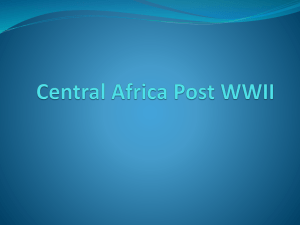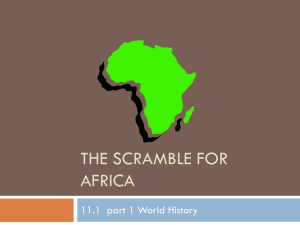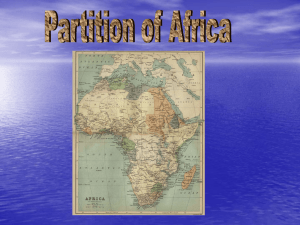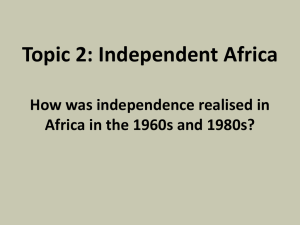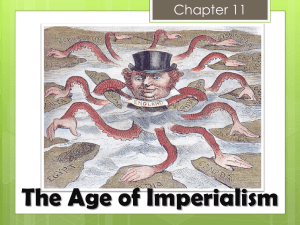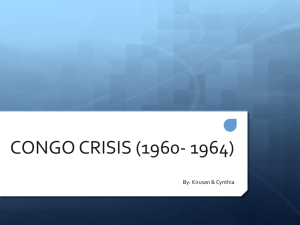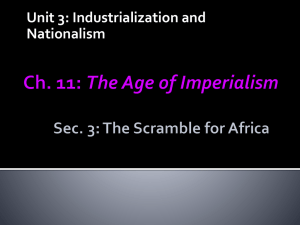mogg
advertisement
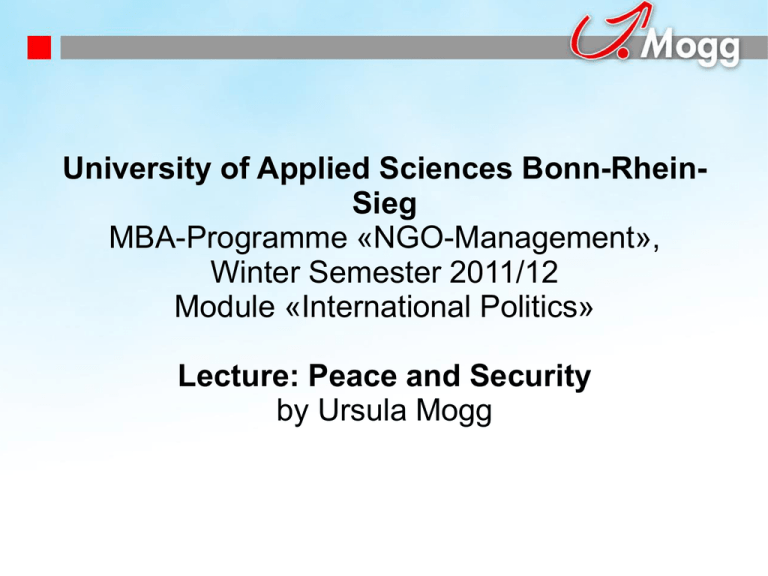
University of Applied Sciences Bonn-RheinSieg MBA-Programme «NGO-Management», Winter Semester 2011/12 Module «International Politics» Lecture: Peace and Security by Ursula Mogg 1. Opening remarks From Fulda gap to Hindukush 2. The new challenges for security and peace Some Papers on Foreign- and Security Politics From a German perspective Common Security and Future of the Bundeswehr, 05/2000 White Paper, 2006 Weise-Report 10. Dezember 2011 Institut für Politische Wissenschaft und Soziologie 2 2. The new challenges for security and peace From an European/International perspective A Secure Europe in a Better World, European Security Strategy, December 2003 NATO 2020 – Assured Securtiy: Dynamic Engagement, May 2010 Interest Security Concept 10. Dezember 2011 Institut für Politische Wissenschaft und Soziologie 3 3. From real life Coalition Agreement betweeg the CDU, CSU and die FDP Chapter: Securing Peace Through partnership and common responsibility in Europe and the world Two Examples Kongo Afghanistan 4. Conclusion 10. Dezember 2011 Institut für Politische Wissenschaft und Soziologie 4 Common Security and Future of the Bundeswehr (Gemeinsame Sicherheit und Zukunft der Bundeswehr, 23. Mai 2000) For the first time in history Germany is surrounded by friends. The world of the year 2000 is completly different to the year 1990 and before. Security is defined not only in military terms. There is a fundamental task to support democracy and humanitarian interests. NGOs and international organisations have a fundamental role. In the 21st century there is no chance for unilateral action. 10. Dezember 2011 Institut für Politische Wissenschaft und Soziologie 5 Risks ands threats ethnic and religious rivalries pandemics violation of human rights climate change failing and failes states ecocide mass migration overpopulation hunger war for borders, water, farmland 10. Dezember 2011 human trafficking, drug traffic, arms trade weapons of mass disruption weapons of mass destruction Institut für Politische Wissenschaft und Soziologie 6 Partners US France GB Russia Middle- and Eastern Europe Mediterranean 10. Dezember 2011 Institut für Politische Wissenschaft und Soziologie 7 Security architecture/Framework NATO European Union (with a very strong emphasis) OSCE UN 10. Dezember 2011 Institut für Politische Wissenschaft und Soziologie 8 White Paper 2006 on German Security Policy and the Future of the Bundeswehr (Weißbuch) The White Paper is a publication of the German Ministry of Defence. It describes the security envirnonment for the years to come and comes to conclusions for the personnel, equipment and training of the Bundeswehr. It was first published in 1969. 2006: „Twelve years have elapsed since the last White Paper on the Security of the Federal Republic of Germany and die Situation of the Bundeswehr was published. During this time, there have been for-reaching changes in the international situation.“ 10. Dezember 2011 Institut für Politische Wissenschaft und Soziologie 9 Threats international terrorism (9/11) proliferation of weapons of mass destruction after-effects of intrastate and regional conflics, destabilisation, internal desintegration of states privatisation of force (Münkler: Die neuen Kriege) globalisation 10. Dezember 2011 Institut für Politische Wissenschaft und Soziologie 10 International Framework NATO EU UN 10. Dezember 2011 Institut für Politische Wissenschaft und Soziologie 11 Security concept comprehensive: „Risks and threats have to be addressed with a suitably matched range of instruments. These include dipolomatic, economic, development policy and policing measures as well as military means and, where called for, also armed operations.“ 10. Dezember 2011 Institut für Politische Wissenschaft und Soziologie 12 Weise Report Reflecting the Mission – Concentration, Flexibility, Efficiency October 2010 „The Federal Minister of Defence will set up a commission which will come up with a proposal by the end of 2010 for key elements of a new organisational structure, including the streamlining of the command and administrative structures.“ (Coalition Agreement 2009) 10. Dezember 2011 Institut für Politische Wissenschaft und Soziologie 13 Weise Report Reflecting the Mission – Concentration, Flexibility, Efficiency October 2010 Paper refers to the Weizsäcker-Paper and the the White Paper 2006 looking for a new political consensus for the tasks of the Bundeswehr (German interests) challenge of asymetric warfare (9/11), technological innovation conscription Bonn/Berlin budget international framework 10. Dezember 2011 Institut für Politische Wissenschaft und Soziologie 14 A Secure Europe in a Better World European Security Strategy December 2003 In reaction to the split of the EU in the Iraq question Javier Solana was asked in summer 2003 to write an European security strategy. It was adopted by the Council in December 2003. Document clarifies its security strategy aims to achieve a secure Europe in a better world identifies the threats facing the Union defines its strategic objectives and setting out the political implications for Europe 10. Dezember 2011 Institut für Politische Wissenschaft und Soziologie 15 Terminology comprehensive approach different aspects of internal and external security are difficult to separate; for some globalisation is frustration and unfair; non-governmental players become more important in global issues; competion for natural ressources – especially water - create migration und turbulences; energy dependence creates concern. 10. Dezember 2011 Institut für Politische Wissenschaft und Soziologie 16 Objectives/main challenges terrorism weapons of mass distruction regional conflicts failing or failed states organised crime 10. Dezember 2011 Institut für Politische Wissenschaft und Soziologie 17 Demands Stability, good governance, multilateralism UN as a framework for preventive action against dynamic threats Core of the strategy is prevention of proliferation 10. Dezember 2011 Institut für Politische Wissenschaft und Soziologie 18 Partners US, Canada, Japan, China, India Tasks humanitarian missions peace-keeping as well as enforcement action 10. Dezember 2011 Institut für Politische Wissenschaft und Soziologie 19 NATO 2020 – Assured Securtiy: Dynamic Engagement May 2010 At their Summit in Strasbourg/Kehl in April, 2009, Alliance leaders directed Secretary General Anders Fogh Rasmussen to convene a broadly-based group of qualified experts to prepare the ground for a new NATO Strategic Concept. The Group of Experts, led by its chair Madeleine K. Albright (United States) and vice-chair Jeroen van der Veer (The Netherlands), began work in September 2009. 10. Dezember 2011 Institut für Politische Wissenschaft und Soziologie 20 NATO 2020 – Assured Securtiy: Dynamic Engagement May 2010 In line with its mandate to encourage an open discussion of NATO’s organisation and purpose, the Group engaged in an extensive series of seminars and consultations with scholars and officials, civilian and military alike, from within and outside the Alliance. The Group, which submitted an interim statement to NATO’s governing body (the North Atlantic Council) on November 24, 2009, presents now its final report. 10. Dezember 2011 Institut für Politische Wissenschaft und Soziologie 21 Security Environment Proliferation international terrorism persistence of corrosive regional, national, ethnic and religious rivalries increased reliance on potentially vulnerable information systems competition for petroleum and other strategic resources (maritime security) demographic changes that could aggravate global problems such as poverty, hunger, illegal immigration and pandemic disease envirnonmental degradation climate change 10. Dezember 2011 Institut für Politische Wissenschaft und Soziologie 22 Role of NATO in 2020 Collective Defence Protecting against unconventional threats Expanding NATO Establishing Guidelines for Operations Outside Alliance Borders Success in Afghanistan Managing Crises 10. Dezember 2011 New Era of Partnerships Comprehensive Approach to complex problems Engaging with Russia Missile Defence Responding Cyber Attacks No World Policeman Institut für Politische Wissenschaft und Soziologie 23 Interests von Weizsäcker: Chapter I „Risks and Interests“ survival of the German citizens and protection of a democtratic political system protection of the stability in Europe (Balkans) maintaining the transatlantic partnership good relations to the US, France, GB support of the transformation in Russia stabilisation of Middle and Eastern Europe looking to the Mediterranean reforming the UN disarmament and arms control 10. Dezember 2011 Institut für Politische Wissenschaft und Soziologie 24 White Paper 2006 preserving justice and freedom, democracy, security, prosperity ensuring the sovereignity and integrity of German territory preventing regional crises and conflicts that may affect Germany's security confronting global challenges (international terrorism, proliferation) helping uphold human rights and strengthening the international order on the basis of international law promoting free and unhindered world trade 10. Dezember 2011 Institut für Politische Wissenschaft und Soziologie 25 White Paper 2006 taking into account Germany's geographical location in the heart of Europe cultivate the close and trusting relationsship with the US strengthen the European area of stability develop and deepen a lasting and durable security partnership with Russia develop and deepen partnerships with countries in far-away regions safeguarding the security interests primarily in international and supranational institutions 10. Dezember 2011 Institut für Politische Wissenschaft und Soziologie 26 A secure Europe in a better world: Being more active more capable more coherent working with partners („No single country is able to tackle today's complex problems on its own.“) 10. Dezember 2011 Institut für Politische Wissenschaft und Soziologie 27 Interests defined in the decisions of the German Bundestag For example: Antrag der Bundesregierung vom 04.11.1998 "Deutsche Beteiligung an der NATO-Luftüberwachungsoperation über dem Kosovo": "Es liegt im besonderen Interesse der Bundesrepublik Deutschland, zur Stabilisierung der Verhältnisse im Kosovo sowie zu einer dauerhaften und tragfähigen Friedensregelung beizutragen und ein Umfeld zu schaffen, in dem eine humanitäre Katastrophe abgewendet werden kann." 10. Dezember 2011 Institut für Politische Wissenschaft und Soziologie 28 Afghanistan In 2001 the epoch-making event of 09/11 changed the international security environment. The international security community answered with military but also with polical means (similar to the Balkans). The Afghanistan Compact has a focus on Security, good governance human rights economical and social development fighting the drug economy 10. Dezember 2011 Institut für Politische Wissenschaft und Soziologie 29 Germany has a focus on creating income drinking water energy education good governance sustainable ecomical cooperation 10. Dezember 2011 Institut für Politische Wissenschaft und Soziologie 30 EUFOR RD Congo Chronology of the Bundeswehr Mission 12/27 2005 Jean-Marie Guéhenno from France, UN-Undersecretary responsible for the blue helmet missions, asks in a letter for „deterrence forces“ from the EU to support MONUC. 04/25 2006 The UN Security Council adopts Resolution 1671/ 2006 for a EU-Mission in RD Congo 04/27 2006 The European Commission adopts a "Joint Action" for the deployment of a multinational contingency to protect the presidential and parliamentary elections in the Democratic Republic of Congo 10. Dezember 2011 Institut für Politische Wissenschaft und Soziologie 31 EUFOR RD Congo Chronology of the Bundeswehr Mission 05/17 2006 The German Government decides on the the mission. 05/24 2006 Approval by the EU. 06/01 2006 The German Bundestag decides. 06/07 2006 Javier Solana, High Represantative for the Common Foreign and Security Policy of the EU, visits the Operations Headquarters (OHQ) in Potsdam-Geltow. 10. Dezember 2011 Institut für Politische Wissenschaft und Soziologie 32 EUFOR RD Congo Chronology of the Bundeswehr Mission 07/05 2006 Minister of Defence Franz Josef Jung (CDU) visits the Demokratic Republic of Congo and Gabun to get informed on the preparatory work for the mission 07/10 2006 Bundeswehr starts to bring its contingency to RD Congo. There will be up to 780 soldiers for four months. 07/30 2006 The first free presidential and parliamentary elections after 45 years take place. 10. Dezember 2011 Institut für Politische Wissenschaft und Soziologie 33 EUFOR RD Congo Chronology of the Bundeswehr Mission 08/21 2006 None of the candidates finds a majority, neither President Joseph Kabila (45 per cent) nor Jean-Pierre Bemba (20 per cent). Both go into a second round October 29. 08/22 2006 Bemba and Kabila men get involved in combat. EUFOR-have to protect European and US diplomats. 10/29 2006 election day. 11/16 2006 The results show that Joseph Kabila is the winner (58 per cent), Jean-Pierre Bemba (42 Prozent). 10. Dezember 2011 Institut für Politische Wissenschaft und Soziologie 34 EUFOR RD Congo Chronology of the Bundeswehr Mission 11/28 2006 The Supreme Court of RD Congo confirms the result. 11/30 2006 After four months the mandate for "EUFOR RD CONGO" ends. 12/01 2006 German Forces are homeward bound. 12/3 2006 German soldiers are home again. 10. Dezember 2011 Institut für Politische Wissenschaft und Soziologie 35 Long lasting decision making process emotions („The heart of darkness“) infant soldiers climate lack of experience in Africa is the RD Congo interested in European help? whether and how? how many soldiers from which countries? 10. Dezember 2011 are'nt we already overstretched (Balkans, Afghanistan, Horn of Africa)? the battle-group concept what can 1500 European soldiers effect in comparison to nearly 17.000 UN soldiers? easy to go in but difficult to go out Headquarter? the obvious wish of the Congolese people to have democratic elections after more than 40 years Institut für Politische Wissenschaft und Soziologie 36 German conditions Congolese approval UN mandate EU mandate place of action (Kinshasa and region) time/duration substantial involvement of a number of European partners 10. Dezember 2011 Institut für Politische Wissenschaft und Soziologie 37 Interests For the first time in the post cold-war era Germany discussed openly its interests among which it discovered for die Mission in RD CONGO: RD Congo is one of the most important countries in Africa. The situation there has a large influence on its neighbours. An instable situation in RD Congo may lead to new civil war and flows of refugees that has direct influence on Europe. The country has a lot of resources among which are those for the construction of nuclear weapons. 10. Dezember 2011 Institut für Politische Wissenschaft und Soziologie 38 Interests For the first time in the post cold-war era Germany discussed openly its interests among which it discovered for die Mission in RD CONGO: interest in the reliability of the UN system and the German wish to become more influencial in this system interest in a more important role for Europe as a partner in the international arena interest in the efficiency of the EU security politics 10. Dezember 2011 Institut für Politische Wissenschaft und Soziologie 39 Important for the decision: responsibility for Africa (The EU summit in London under the British Presidency had decided on a strategy for Africa in 2005) the Ruanda experience development policy (Germany and the EU invested a lot of money and time in stabilisation and in the preparation of the elections) deterrence credibility of German foreign policy creating an additional value for the UN mission a signal for the Congolese, visibility protect the international personnel, evacuation RD CONGO is of strategic importance 10. Dezember 2011 Institut für Politische Wissenschaft und Soziologie 40 Evalutation EUFOR RD CONGO was not a political „hero story“. It did not really prove that the EU is ready to deliver. A lot of work has do be done in the (near) future). The mission showed that the EU seems to be overstrained and doesn't have the experience for missions in Africa. The coordination between the different soldiers was defective. There was a lot of discussion on the numbers of soldiers and the headquarter. There were a lot of practical problems during the mission (accomodation, bord, service) because of a lack of experience. 10. Dezember 2011 Institut für Politische Wissenschaft und Soziologie 41 Evalutation In Germany the decision on EUFOR was mainly influenced and encouraged by the Ministry of Development, the Foreign Office and its parliamentary counterparts. Resistance came from the different military levels. The Congolese where sure that they had a free election. Deterrence was successful. Altogether he mission is said to be a success but not a blueprint. The first time in its history the EU led a multinational military mission to suppurt the UN. More work has do be done to help RD Congo to become a stable democracy: politically, economically, in human rights and humanitarian terms. Institut für Politische Wissenschaft und 10. Dezember 2011 42 Soziologie Coalition Agreement between CDU, CSU and FDP Chapter: Securing Peace through partnership and common responsibility in Europe and the world „The world has become smaller. And we have realised that we all inhabit this one world. Cimate chance, issues of development in many regions of the world, international terrorism and the consequences of the international financiel and economic crisis have all mad it obvious that we can only effectively combat major challenges if we work tother on a global basis.“ 10. Dezember 2011 Institut für Politische Wissenschaft und Soziologie 43 Coalition Agreement between CDU, CSU and FDP Germany in Europe Value-oriented and interest-led foreign policy Germany's international responsibility International deployment and instruments within German security policy Modern and efficient German Armed Forces (Bundeswehr) Protecting human rights – promoting the rule of law Cultural relations and education policy Development co-operation 10. Dezember 2011 Institut für Politische Wissenschaft und Soziologie 44 Some observations In foreign affairs and security politics their is usually a broad concensus in all parties (except the LINKE). The Coalition agreement reflects this. „Germany's future in peace, freedom, security and prosperity is enextricably linked to political developments in Europe and the world. We are committed to a policy that both serves the interests of our country in a unified Europe and contributes to peace in th world. To this end, wie assume a formative role in the alliances and international organisations with wihich we cooperate.“ 10. Dezember 2011 Institut für Politische Wissenschaft und Soziologie 45 Some observations Their are a lot of examples that show the liberal origin. „A an export nation we have a great interest in preserving the liberal structures of the global economy on the basis of the charter for sustainable economic activity and in free and secure transport routes.“ In some ways the paper seems to be very detailed. „We advocate substantially increasing the equal use of the German language as a working language in European institutions; ….“ 10. Dezember 2011 Institut für Politische Wissenschaft und Soziologie 46 Some observations The search for compromise is obvious at certain points. „If the EU does not have the capacity to absorb a new member or if Turkey should not be in an position to meet all the obligations of membership, Turkey must be linked as close as possible to European structures in a way that allows the country to further develop its prvileged relationsship with the EU.“ The lifespan of some regulations seems to bee not very long. „The military service obligation has justified itself and proved its value in recent decades. … The coalition partners remain firmly committed to the principle of the general military service obligation; we aim to reduce the period of miilitary service to six months by 1 January 2011“. 10. Dezember 2011 Institut für Politische Wissenschaft und Soziologie 47 Thank you very much for listening! Questions? 10. Dezember 2011 Institut für Politische Wissenschaft und Soziologie 48


